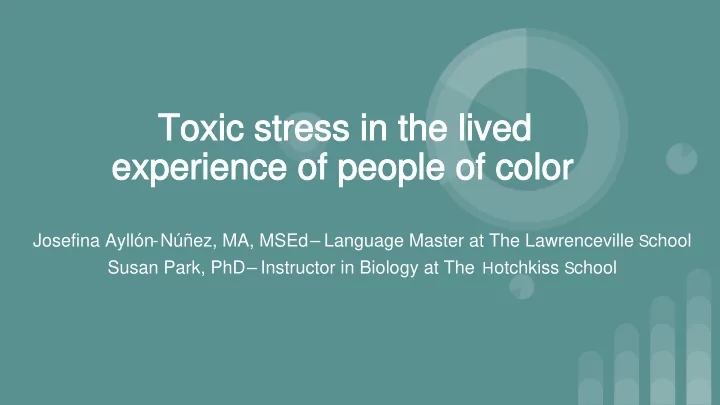

Toxic stress in the lived Toxic stress in the lived experience of people of color experience of people of color Josefina Ayllón-Núñez, MA, MSEd – Language Master at The Lawrenceville S chool Susan Park, PhD – Instructor in Biology at The H otchkiss S chool
A moment to slow down… A moment to slow down… ★ Settle into your seat ★ A moment to honor tolerance & acceptance ★ Keep an open mind ★ Non-judgment ★ Understanding one’s own reaction to the conference and experiences therein
Comments we may hear about persons of color in Comments we may hear abou t persons of color in our communities: our communities: about Student POCC… about Adult POCC… ★ rebellious ★ difficult ★ lazy, undisciplined ★ not part of the community ★ not trying hard enough ★ doesn’t get it ★ …sigh ★ …sigh ★ … eye roll ★ … eye roll
What is ‘toxic stress’ ? What is ‘toxic stress’ ? A working definition ★ a child experiences strong, frequent, and/or prolonged adversity— such as physical or emotional abuse, chronic neglect, caregiver substance abuse or mental illness, exposure to violence, and/or the accumulated burdens of family economic hardship—without adequate adult support. ★ This kind of prolonged activation of the stress response systems can disrupt the development of brain architecture and other organ systems, and increase the risk for stress-related disease and cognitive impairment, well into the adult years. https://developingchild.harvard.edu/science/key-concepts/toxic-stress/
How to address toxic stress in How to address toxic stress in our lived experiences our lived experiences CLICK IMAGE TO ACCESS VIDEO LINK
Discussions: Robin Diangelo Discussions: Robin Diangelo ★ How can we as teachers of color help our students of color become more comfortable in the classroom? ★ How can teachers of color face their own biases?
Examples of toxic stress Examples of toxic stress ★ Actions are mistrusted and generally not given benefit of doubt (feeling of being watched) ★ Requests for help go unanswered or denied (clubs, independent projects, rides/transportation) ★ Recognizes a double standard of expectations- attendance, discipline matters, grades, extra help, attention given, opportunities to develop talent, dorm rules ★ Personal needs are quickly dismissed as irrelevant and unimportant (swimming, food of a different culture, personal care) ★ Lack of recognition- club positions, awards ★ Called to frequent discipline meetings; called out for misbehavior ★ Disproportionate resources allotted (team transport; dorm feeds) ★ Constantly having to re-affirm, verbally or in action, that you belong
Small Small-Group Interactive Discussion: Group Interactive Discussion: Learning from our collective experience as people Learning from our collective experience as people of color of color 1. How does the concept of toxic stress apply to me and my students? 2. What are some toxic stressors at my school? 3. How do I recognize and respond to toxic stress situations? Poll everywhere
Are these symptoms of exposure to toxic stress? Are these symptoms of exposure to toxic stress? ★ Poor social integration >> ○ Doesn’t go to social gatherings ○ Difficulty adhering to close friends ★ Average or below average grades >> ○ Can’t concentrate ○ Lack of interest ★ Absenteeism , frequent tardies >> ○ High tolerance for “punishment”
Social and Behavioral Determin Social and Behavioral Determinants of Toxic Stress ants of Toxic Stress In this science talk, Professor David Williams of the Harvard T.H. Chan School of Public Health looks at the social and behavioral factors–including socioeconomic status, race, discrimination, and place–that play a role in triggering toxic stress for children and adults. He also discusses what effective solutions for reducing toxic stress and improving health must look like. (Harvard University Center on the Developing Child) CLICK IMAGE TO ACCESS VIDEO LINK
Sources Sources ★ Teaching Tolerance - Interview with Robin DiAngelo ○ https://www.tolerance.org/frameworks/social-justice-standards ★ Harvard University Center on the Developing Child ○ https://developingchild.harvard.edu/resources/aces-and-toxic-stress-frequently- asked-questions/ ★ Nadine Burke Harris TED Talk “How Childhood Trauma Affects Health Across a Lifetime” ★ Center for Disease Control Adverse Childhood Experiences Study ○ https://www.cdc.gov/violenceprevention/acestudy/about.html ★ NPR Adverse Childhood Experiences “Take the ACE Quiz” ○ https://www.npr.org/sections/health-shots/2015/03/02/387007941/take-the- ace-quiz-and-learn-what-it-does-and-doesnt-mean
Recommend
More recommend